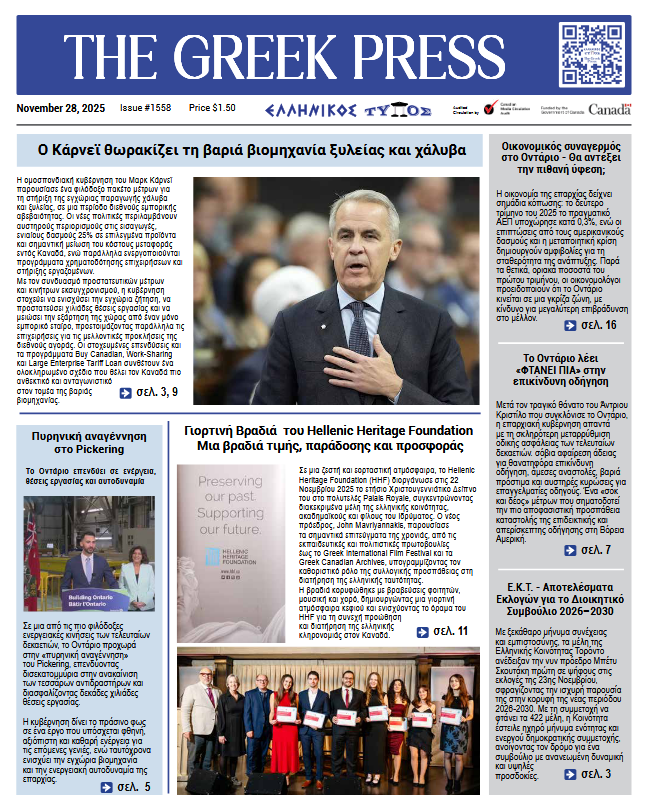 CLICK TO VIEW THE WHOLE PUBLICATION ONLINE
CLICK TO VIEW THE WHOLE PUBLICATION ONLINELuigi Cherubini’s Medea has finally premiered in Toronto, a handful of years since it opened in Paris in 1797. No need to get churlish about it because it had its New York debut at the Met in 2022. In fact, what we have is a coproduction by the COC, the Met, the Greek National Opera and the Lyric Opera of Chicago. That’s quite a cast.
The COC’s Medea deserves a thunderous ovation on all counts. The cast, the direction, the orchestra and the design are probably of historic importance and a repetition of a production of this quality may not be around the corner. Let’s hope we don’t have to wait 217 years.
The opera is dominated by its central character, Medea, sung by the incomparable Sondra Radvanovsky. The soprano must handle a complex character who goes through a gamut of emotions that most of us cannot imagine. Medea was a princess and a sorceress in Colchis, a city on the east shore of the Black Sea, today’s Georgia. She betrayed her father to help the Greek hero Jason get the Golden Fleece. They married and had two children but Jason abandons her to marry Glauce, the daughter of Creon, King of Corinth.
We need to keep in mind that Medea committed gross crimes against her father and her country, became an outcast in Corinth, all to help Jason. He betrays her for another woman and Medea is in danger of losing everything, especially her two children. She still loves Jason who rejects her, she still loves her children and wants to kill them. The complexity and depth of emotions make her a woman full of pain, fury and betrayed love and she morphs into a monster. She decides to kill Glauce on her wedding day by giving her a poisoned garment and butcher her children as the ultimate revenge against Jason. She accomplishes both despite all moral standards to the contrary. Iago, Lady Macbeth, Clytemnestra and Lizzie Borden have nothing on this lady. I mention all of this because it is important to understand Medea’s character and appreciate the magnitude of Sondra Radvanovsky’s performance.
Cherubini’s opera contains all those conflicting and terrifying emotions and it is up to Radvanovsky to express them. She has the vocal power, the magnificent vocal prowess and the tonal expressiveness, beauty and fury to achieve it all. She rolls on the floor, agonizes about her decision. She pleads, indeed begs for her children, loves, cajoles but all her efforts fail. In the end, she slaughters her children in a performance that should be embedded in one’s mind indefinitely.
Soprano Zoie Reams gives a distinguished performance as Neris, Medea’s maid. She is faithful to the nth degree and delivers the poisoned garment to Glauce. Her singing is deeply moving and she turns a relatively minor role into a triumph.
Soprano Jane Brugger sings the role of the hapless Glauce who is about to marry Jason. She is nervous and afraid of what Medea might do and is brutally and mercilessly killed. She is the blameless victim of Medea’s vengeful fury and she sings her aria “O amore, vieni a me!” (Love, come to me) with such longing and fear that leaves one deeply moved.
King Creon and the ambitious Jason who is marrying Princess Glauce for the throne are not as sympathetic as the women though one could argue that no one is as bad as Medea. Tenor Matthew Polenzani is a virile Jason who pleads for his children and tries to be conciliatory to Medea but he does not get too much sympathy. Polenzani sings superbly and his Jason is well drawn.
Bass-baritone Alfred Walker plays the authoritative King Creon who tries to assuage Medea’s fury by promising to look after her children – and raise them in the temple. Kudos to Walker for an authoritative performance vocally and physically.
Two more stars deserve mention and praise. The COC Orchestra under the baton of Lorenzo Passerini performed Cherubini’s complex score with exceptional ability.
David McVicar’s direction and set design deserve the ultimate accolade of the word masterpiece. The set features a huge mirror above the performers so that we see the back of the performers as well as the front. There is judicious use of projections that in the end give one an extraordinary visual effect. The full drama of the opera is displayed in an unforgettable production. It is as if we are making up for ignoring the opera for so long.
Medea by Luigi Cherubini (music) and Francois-Benoit Hoffman (original libretto in French) in Italian version by Carlo Zangarini will be performed six time’s on various dates until May 17, 2024, at the Four Seasons Centre for the Performing Arts, 145 Queen St. West, Toronto, Ontario. www.coc.ca.
A scene from the COC’s production of Medea. Photo: Michael Cooper






























